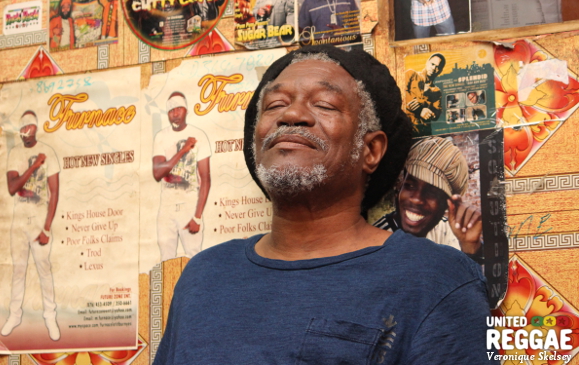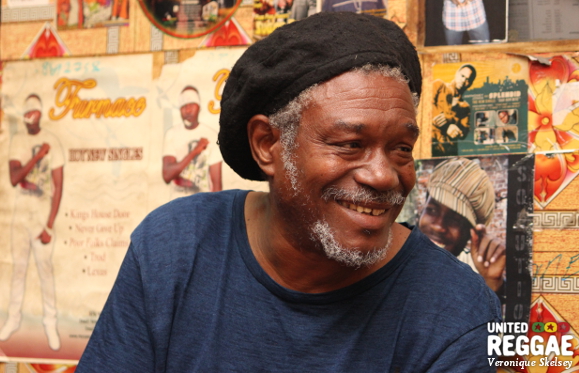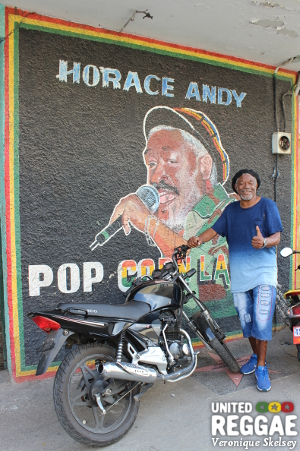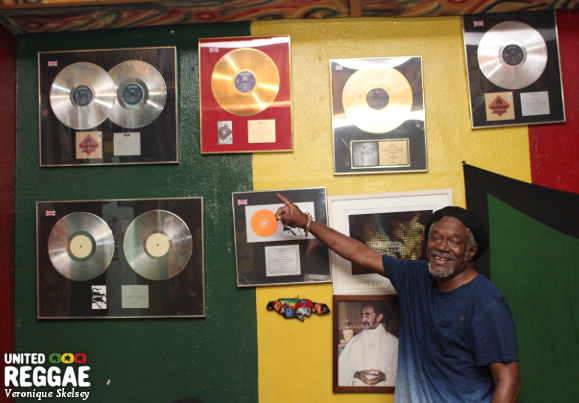Articles about reggae music, reviews, interviews, reports and more...
Interview: Horace Andy in Kingston
- Home
- Articles
- Interviews
- Interview: Horace Andy in Kingston

Interview: Horace Andy in Kingston
"When you speak the truth no one believes you"
Sampler
Jamaica’s Reggae Month falls in February to include the birthdays of Bob Marley and Dennis Brown. But there is another veteran artist who celebrates his birth that month – the distinctive voiced singer songwriter Horace Andy.
Born Horace Hinds, he took the name Andy in reverence of Bob Andy – for his song-writing prowess. Like his namesake he spent his formative years at Studio 1 – before freelancing for producers including Phil Pratt (who actually discovered him prior to his Studio 1 success), Derrick Harriott, Keith Hudson, Leonard Santic Chin, Bunny Lee, Tappa Zukie, Everton Da Silva and Lloyd Bullwhackie Barnes.
Since then Horace Andy may have rubbed shoulders with popular music high society through his 90s Massive Attack collaborations; but his Kingston Pop Corn studio is downtown in the ghetto on Bond Street. Outside he has his own starred paving stone (shared with the Jamaicans) alongside Alton Ellis, John Holt, Duke Reid, U-Roy, Phyllis Dillon, The Paragons, The Three Tops, The Melodians, Stranger Cole and Errol Dunkley.
Inside, Horace holds court, recounting how his idol was Jimi Hendrix, what Massive Attack got up to on tour, the tragedy of Amy Winehouse, and how Justin Hinds was his first cousin. The man they call “Sleepy” keeps his eyes semi closed and speaks in a honeyed half whisper as we conduct a rare interview. He has a world weary cool about him and clearly doesn’t suffer pretentiousness or foolishness yet he is friendly and accommodating all the while.
Despite the huge vintage back catalogue drawn at his ever impressive live shows, Horace doesn’t dwell on the past; so we don’t delve as deep into history as with some of his contemporaries. “Not a bad little reasoning” says Andy at the end. Given his thoughts on interviews below – we got off lightly!

What new material are you working on at the moment?
Nothing really special but I do have new material. I have three brand new albums and I am working on another one. I just do songs and do songs. I don’t really say “I’m going to make an album”. I just make songs.
Are these all self-produced albums?
Yeah man. By myself. Me alone play everything. What I can’t manage I will bring in other people who are more professional than me.
 I have three brand new albums and I am working on another one
I have three brand new albums and I am working on another one
Who was it that first encouraged you to produce?
To tell you the truth, I think it was myself. From a long time when I was really young that was one of my dreams that I wanted to do – record my own songs.
What was the first song you ever wrote?
(pauses) That’s one that licked me now! (laughs) I cannot specifically tell you but the first song I sang at Studio 1 was Got To Be Sure.
Fil Callender, drummer at Studio 1, said when you first auditioned for Coxsone Dodd in the late 60s, the musicians were quite taken aback by the sound of your voice – but Coxsone heard the potential in it.
(laughs) They all laughed man. They put down their instruments and they laughed and laughed! They never heard anything like that before. But you know? That’s how it is. If someone invents something, when they first try it out everyone laughs and says “What is that?!”
Your song writing abilities were used by other artists as well as yourself. When you were singing with Phil Pratt in the mid-70s you wrote The Half for Dennis Brown and Strange Things for John Holt. Can you confirm this?
(laughs) I didn’t actually write Strange Things for John Holt. The original one I did was in 1974. It’s still up at Coxsone’s studio. But at that time I couldn’t control my voice like now. So when I first made it at Studio 1 I left and went to Phil Pratt to do it because Mr Dodd wouldn’t put it out. So I went and sang it for Phil Pratt and I had the same problem. Then Phil Pratt gave it to John Holt and I didn’t know. What About The Half – Dennis was always asking me for that song because he loved it, so I decided to give it to him one day.
 What About The Half – Dennis was always asking me for that song
What About The Half – Dennis was always asking me for that song
Do you have a cut of it yourself, somewhere in the archives?
No no no. Never never.
So are there any other songs that were made famous by other artists that you actually wrote?
A lot of songs. You Are My Angel for Massive Attack, Spying Glass, Girl I Love You – those songs I wrote and we collaborated.

Of course, but you had already released your own cuts of those songs. I am asking whether there were any songs sung by other reggae artists that you wrote but never released.
No no no.
So you learned from that experience then?
Yes. Most of my songs – I wrote them.
You often say on stage that your favourite Studio 1 song is Every Tongue Shall Tell. Why is that your favourite?
Yes. Well for some Christian minded people and Rasta people it means any wrong you do you are going to have to talk when the time comes. Because that’s what they say the King James Version tells us. That’s what the Bible says and you must live by what the Bible says. But you know the people are not doing it. They only talk it. But that is the reason why [I sang it] because of the inspiration of the Bible. It was before I was even born – “Every tongue shall tell” that means everyone shall confess their wrongs when the right time comes.
Why did you feel the need to write Money The Roots Of All Evil which you recorded for Phil Pratt and more famously for Bunny Lee?
Because I saw it. As a young man growing up I saw it. Because money, wow, it has its good and it has its bad. And because producers weren’t paying me – that’s why I wrote that song.
 Producers weren’t paying me – that’s why I wrote Money Money
Producers weren’t paying me – that’s why I wrote Money Money
What about See Man’s Face at Studio 1?
See A Man was something that happened a long time ago. You see, when you speak the truth no one believes you. I learned that a long, long time ago. Even when you tell your mum “Mum, it’s not me do it” you get bap bap “A you do it!” That’s why more time you have to be close to the kids them and believe them when they tell you things. So I know from a long time ago that no one believes the truth when you talk the truth. That’s why I wrote that song. And because a young man broke my little sister’s heart. It had so much meaning that he broke my little sister’s heart and that’s why I wrote that song then.
Was there a specific woman who inspired You Are My Angel?
No. Those things just came natural. We love the woman and we look upon her as the mother of the earth. She multiplies and she creates so the father says life. Life is so important so we have to love and respect the woman. Don’t kick them, don’t box them, don’t rape them – no no no. I say it on stage and the ladies scream “We love you Horace!” (laughs)
 We love the woman and look upon her as the mother of the earth
We love the woman and look upon her as the mother of the earth
Can you tell me how you came to duet with Vivian Jackson on a song called Undivided World?
That was a long time ago. I don’t even remember that song! Because it was so long ago.
Since that time that you auditioned for Coxsone a lot of people have copied your vocal style but they can’t copy your song-writing.
 Yeah man. I don’t think anyone can copy a song unless they use some of the words and change it. But the voice – a lot of people tried. A lot of people tried to sing like Dennis Brown. And a lot of people tried to sing like me – Wayne Jarrett, Madoo, Icho Candy – a lot of people. Which is good for me man! That means I have done something good.
Yeah man. I don’t think anyone can copy a song unless they use some of the words and change it. But the voice – a lot of people tried. A lot of people tried to sing like Dennis Brown. And a lot of people tried to sing like me – Wayne Jarrett, Madoo, Icho Candy – a lot of people. Which is good for me man! That means I have done something good.
Out of all the people who sang like you – which is your favourite?
Wow! (laughs) Garnett Silk.
Really? A lot of people have tried to imitate him as well.
Yes. Because when a lot of people listen to Garnett Silk you hear it. That’s why he sang over my Skylarking. And when his wife first saw me she ran for her two sons and bring them come and said “A Horace Andy this” and that’s how I know I inspired their dad. Because she wouldn’t do that – bring her sons to meet me [otherwise]. Well, that’s good.
 A lot of people tried to sing like Dennis Brown. And a lot of people tried to sing like me
A lot of people tried to sing like Dennis Brown. And a lot of people tried to sing like me
You don’t like to look back too much. When you perform live with your Dub Asante band from England you always sing a spread of songs from across all the eras you sang in. You often open with Must Surrender from your 2008 Trojan album On Tour.
Yeah but most of the people have their favourites they like to hear. Some fans just come to hear Skylarking but they get to know every song I sing. Some just want Money Money but they will love all the songs – even if they just want to hear Money Money.
Some artists who have been around as long as you have will cuss off modern dancehall music – but you aren’t like that.
No no no. I think those kids are brilliant musicians. Freddie McGregor’s sons are brilliant, brilliant musicians. I cannot fight against the youth them. Some of the songs, the lyrics they might be too raw, but some of them are not too raw. They say it’s dancehall music and I still say so too but the original dancehall music is coming from the 60s. I cannot fight against the youth them. Some of their lyrics are too raw and I don’t like it but I will never bring them down. I hear a lot of old artists saying “Oh, that is not reggae music. We used to do reggae music”. But if the beat goes like this [taps out heartbeat on the bench] it still has the one drop. No matter what, the one drop is still there so it’s still reggae music. I’m not going to fight them because if I was their age that is what I would be doing.
What were you doing when you were their age?
When I was a young man I used to listen to all Bob Marley and all the conscious people and I used to go to Ethiopian World Federation. So coming up as a young man I used to really know the history of Marcus Garvey, Arawak Indians, American history, the slave trade, everything I would read. I used to go to the library and I used to sit down and wonder to myself and say “The reason I go to the library is because there was something there set for me to do so I have to go and learn”. I never knew I was going to come and sing all of these things that I read. The Father works in many ways!
 Consciousness lives and it cannot die
Consciousness lives and it cannot die
What do you think of the new young roots artists that are gaining interest internationally?
It’s that which shows you that consciousness lives. Consciousness lives and it cannot die. That’s why we have conscience. To show you no matter how much we have degraded songs that they make about ladies and other people the good ones are still there. The good one will always come. If you listen the good one always comes.
If you go to the dance sometimes and you’ll be there for two or three hours and all you hear is “On the woman” this and “On the woman” that and “Bun this” and blah blah blah and you think “This doesn’t come with the music”. Every time you hear “Hold up the gun hand” or “Bun batty man” or “Skin up this” or “Cock up that” – we don’t need those things there man. We don’t need it all the time. We need to hear some consciousness.
The whole world changed. If you look back to ten years ago right up to now – it gets so evil man. You see it on the news. It’s just kill kill kill. Why? It’s sad. But that’s why we are here. To always bring that consciousness. A good will stands out over evil no matter what.

What do you think of the concept of reggae month? And black history month at the same time?
That is good. This month is my month. It’s good man. Black history month is also good. But the people them – are not listening. (laughs) The people who we would love to take black history month seriously – they are not. I tell you this, right, Caucasians, they learn more, they conscious more than a lot of black people who are saying “Freedom freedom”. They just jump on a bandwagon and that’s it. At first when I used to see the Rastaman who is Caucasian I used to say “How can they be Rasta?” But they are so serious. They take it so seriously. More than a lot of Rasta people here in Jamaica.
It was your birthday last week - how did you celebrate?
As a person I don’t drink a lot. So I did full-joy myself but not like some people drink a lot. But it was really nice, thank you.
 Coming out of this little island to so many millions of people all over the world. That’s the best achievement
Coming out of this little island to so many millions of people all over the world. That’s the best achievement
Next year will be 50 years in the business for you.
Yeah (laughs). That’s really nice. I hope the father will let me be live spare and I can celebrate it and remember it!
What has been your favourite achievement in those 50 years?
My favourite achievement is with Massive Attack. [Points to discs on the studio wall]. I am blessed with Massive Attack I think. That’s one of the best achievements. But the best achievement I think was to be coming out of this little island to so many millions of people all over the world. I think that’s the best achievement. Because if it wasn’t then you wouldn’t be here! (laughs) It’s nice talking to you man.
You don’t do many interviews – do you not like doing them?
Honestly no! I’ve done more than one interview and where you asked me what I think about “What do you think about the young artists?” and where I said that “I love what they do but some of the things are too raw”. Somebody went back and said that I don’t like the youth them and what they do. They said the wrong thing and artists came up in my face so we had a big argument. That kind of got to me and it happened more than one time. So when you asked me about the young artists I was going to tell you “No I don’t want to answer” but I still did it.
 Anything good, they try to beat it down
Anything good, they try to beat it down
I remember when I was young and I was singing my mother would say “Every day you get up bout this Rasta Rasta Rasta! A no music that! A rock song – that a no music!” She’d start “Derrick Morgan! Prince Buster! Skatalites! Those are music”. So when I hear the youth them and people saying things it reminds me of when I was coming up and they would beat me left and right “Do not sing the Rasta song when we go out on the road”, “Oh, Rasta this and Rasta that” – everybody. That’s what they did to Sizzla, Capleton, Buju Banton, Luciano and I can go on and on. Anything good, they try to beat it down. If you jump out in the street and be like [Sings meaningless party tune] and you will see the crowd will be like “Yeah!” but if you say “Go to church tomorrow morning” then “A what him a chat say? About which church?” (laughs)
Read more about this topic
Comments actually desactivated due to too much spams
Browse by categories
Recommended Articles
Latest articles
Recently addedView all
© 2007-2026 United Reggae. All Rights Reserved. Reproduction in whole or in part is prohibited. Read about copyright
Terms of use | About us | Contact us | Authors | Newsletter | A-Z














